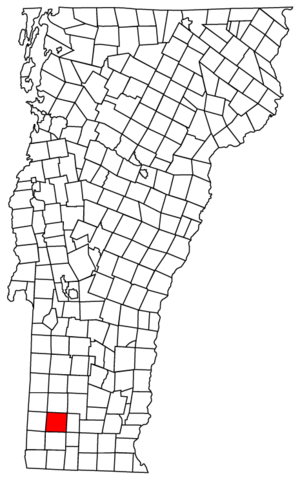Glastenbury, Vermont facts for kids
Glastenbury is a very small town in Vermont, United States. It's located in Bennington County. What makes Glastenbury special is that it's one of only two towns in Vermont that are "unincorporated." This means it doesn't have its own local government, like a mayor or town council. Instead, a supervisor appointed by the state helps manage its affairs. In 2020, only 9 people lived there!
Contents
Where is Glastenbury?
Glastenbury is in the middle of Bennington County. It shares borders with other towns like Sunderland, Shaftsbury, Woodford, and Somerset. A big part of Glastenbury is inside the Green Mountain National Forest, which is a large protected area.
The highest point in town is Glastenbury Mountain, which stands about 3,748 feet (1,142 meters) tall. Two very famous hiking paths, the Long Trail and the Appalachian Trail, go right through Glastenbury. They follow the top of the Green Mountains from north to south.
The town covers about 115.1 square kilometers (44.4 square miles) of land.
Glastenbury's Past
Glastenbury was first officially created in 1761 by the governor of New Hampshire, Benning Wentworth. But it took many years for people to actually move to this rocky, mountainous area.
Early Settlers and Challenges
When Vermont had its first census in 1791, only six families lived in Glastenbury. Life on Glastenbury Mountain was very hard. By 1800, these first families had left, and eight new families moved in. Even then, only a few of these new families stayed for very long.
Despite the difficulties, more people slowly arrived. The population grew to 76 by 1810. However, the years after 1810 were tough for all of Vermont, and by 1840, only 53 people remained in Glastenbury.
The Logging Boom
After the American Civil War, Glastenbury started to grow more quickly. Companies in nearby Bennington wanted to use the huge amount of timber (trees) in Glastenbury. By 1872, they began building a special railroad, like a trolley, that went up the mountain. This was a difficult project because some parts of the track climbed as much as 250 feet (76 meters) for every mile! You can still see parts of the old trolley tracks today.
The population grew to 199 in 1870 and then to 241 in 1880. Many temporary workers also came to the mountain to work in the busy logging business. Two more sawmills were built in the 1870s. One was at the original settlement, called Fayville. The other was at the end of the railroad line, which became known as South Glastenbury.
Many kilns (special ovens) were built at South Glastenbury to turn the cut wood into charcoal. At this time, Glastenbury was one of the top places in Vermont for making charcoal. This charcoal was used to help produce iron in nearby Shaftsbury and in Troy, New York.
The Town's Decline
By the late 1880s, most of the big, old trees on the mountain had been cut down. This caused the town's economy to drop a lot. In 1889, the railroad stopped running.
It was briefly restarted in 1894 as an electric passenger trolley. There was a hopeful plan to turn South Glastenbury into a tourist spot. A lot of money was spent to make it a mountain resort, which opened in the summer of 1898. But that winter, a big flood (called a freshet) washed away the railroad tracks. This was the beginning of the end for Glastenbury as a busy town.
The number of people living there continued to shrink in the early 1900s. By 1937, only seven people lived in Glastenbury. Because the population was so low, the state legislature decided to make the town "unincorporated."
Population Changes Over Time
| Historical population | |||
|---|---|---|---|
| Census | Pop. | %± | |
| 1790 | 34 | — | |
| 1800 | 48 | 41.2% | |
| 1810 | 76 | 58.3% | |
| 1820 | 48 | −36.8% | |
| 1830 | 52 | 8.3% | |
| 1840 | 53 | 1.9% | |
| 1850 | 52 | −1.9% | |
| 1860 | 47 | −9.6% | |
| 1870 | 119 | 153.2% | |
| 1880 | 241 | 102.5% | |
| 1890 | 181 | −24.9% | |
| 1900 | 48 | −73.5% | |
| 1910 | 29 | −39.6% | |
| 1920 | 40 | 37.9% | |
| 1930 | 7 | −82.5% | |
| 1940 | 4 | −42.9% | |
| 1950 | 1 | −75.0% | |
| 1980 | 3 | — | |
| 1990 | 7 | 133.3% | |
| 2000 | 16 | 128.6% | |
| 2010 | 8 | −50.0% | |
| 2020 | 9 | 12.5% | |
| U.S. Decennial Census | |||
In 2000, there were 16 people living in Glastenbury. These people lived in 6 households, and 4 of them were families. The town had a very low population density, meaning there were very few people per square mile.
See also
 In Spanish: Glastenbury para niños
In Spanish: Glastenbury para niños
 | Delilah Pierce |
 | Gordon Parks |
 | Augusta Savage |
 | Charles Ethan Porter |


